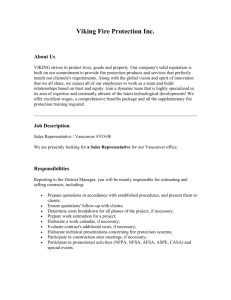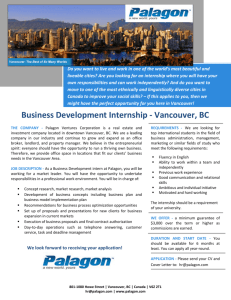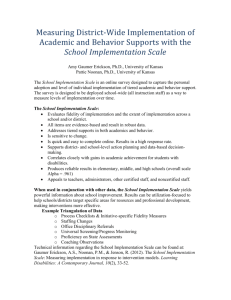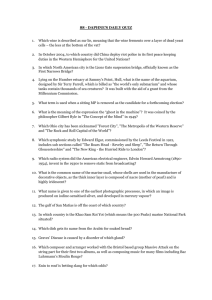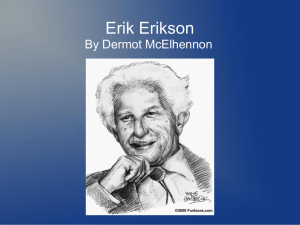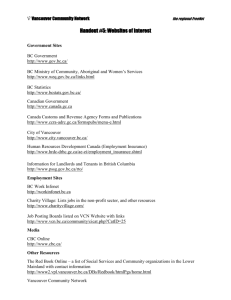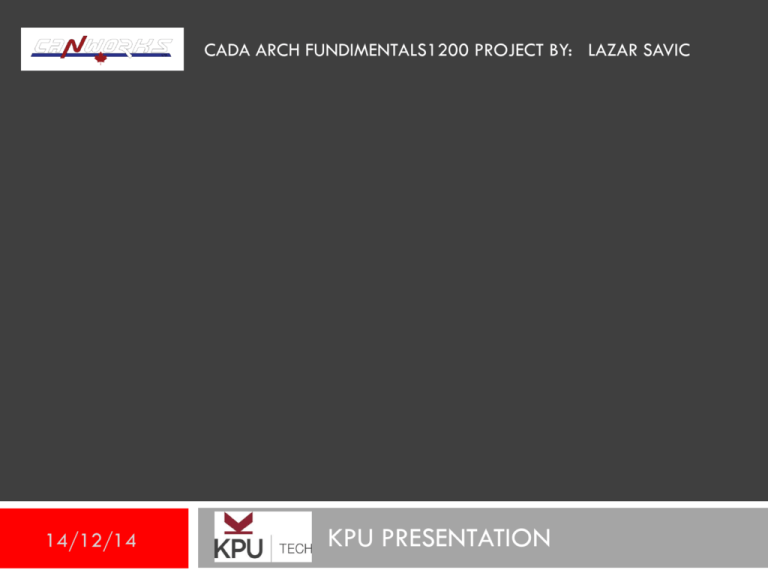
CADA ARCH FUNDIMENTALS1200 PROJECT BY: LAZAR SAVIC
14/12/14
KPU PRESENTATION
LOG-01
THE STORY OF ARTHUR CHARLES ERICKSON
Arthur Erickson was born June the 14th, 1924
in Vancouver BC to Myrtle and Oscar
Erickson. He spent much of his childhood
surrounded by the arts and taking part in
them himself, often creating paintings
influenced by the surroundings of the
Vancouver west coast. Erickson had
surrounded himself with local artists such as
Bert Binning, Jack Shadbolt, Lawren Harris
and George Swinton.
LOG-01
THE STORY OF ARTHUR CHARLES ERICKSON
Erickson was enrolled in the Canadian Army Intelligence
Corps during World War II where he served as a
Japanese-English translator. Erickson Studied for a few
years at the University of British Columbia where his
main focus of study was in foreign diplomacy. It was
only after a visit to Bert Binnings home in West
Vancouver that he began to think of a career in
architecture. Then, upon reading a copy of Fortune
magazine which contained the first colour photographs
of Frank Lloyd Wright’s Taliesin West house in Arizona,
Erickson immediately made the decision to pursue
architecture. Erickson then transferred in 1946 to McGill
University’s Department of Architecture. He graduated
from McGill top of his class in 1950.
LOG-01
Famous Local Work
Filberg Residence 1957
Evergreen Building Vancouver
UBC Museum of Anthropology
Waterfall Building Vancouver
Giant spring-Provincial Court
Vancouver
Vancouver Robson Law Courts
Complex
LOG-01
Famous International Work
Canadian Embassy
Washington D.C.
Expo 70 Osaka Japan
Canadian Pavilion
One, California Plaza
Fresno City Hall
NAPP Laboratories
Cambridge England
Tacoma Museum of Glass
LOG-02
CONCEPT IDEA INSPIRATION
LOG-02
FINAL CONCEPT
LOG-02
AFTER CONTRUCTION
LOG-01
THE CAREER OF ARTHUR CHARLES ERICKSON
In Arthur Erickson: An Architect’s Life, David
Stouck wisely takes the middle road, a more
or less chronological approach that opens
and closes with insights into the man and the
people he loved, with stops in between at the
major events, encounters and works of a
half-century career.
The early chapters are a revelation. Arthur’s
parents, Oscar and Myrtle Erickson, were an
ebullient and eccentric pair straight out
of You Can’t Take It With You. Despite losing
his legs in the First World War, Oscar was a
dynamo at his dry goods business, a keen
sportsman and an amateur painter.
LOG-01
THE CAREER OF ARTHUR CHARLES ERICKSON
Myrtle was an enthusiastic, if not entirely competent,
cook, social convenor and arts patron who helped
found the Vancouver Art Gallery.
Erickson with mother Myrtle
Once, after a quarrel, Arthur’s younger brother Don
killed all the fish in Arthur’s aquarium. The family
couldn’t afford to restock the tank, so at his mother’s
urging Arthur painted fish on his bedroom walls
instead.
“He began by copying two fish from photographs in
National Geographic and then, with growing
confidence, covered all four walls of his room with
underwater scenes featuring sunken wrecks, seahorses,
sharks, shrimp.”
LOG-01
THE CAREER OF ARTHUR CHARLES ERICKSON
Impressed, his father bought the boy his own set of
paints. Arthur then painted his brother’s room in a
jungle theme, making it a favourite hangout for
neighbourhood boys. Then one of Myrtle’s friends
paid the budding muralist $50 to paint an English
hunting scene in her basement.
The book includes strikingly detailed accounts, not
only of Arthur’s accomplishments and education, but
also of his adventures with friends and even of his
thoughts.
LOG-01
THE CAREER OF ARTHUR CHARLES ERICKSON
Stouck says in an author’s note that the biography is
“grounded” in a series of interviews with Erickson in
the four years preceding his death in 2009. But he
has also spoken to dozens of the architect’s friends,
family and associates, going back to his adolescence
in the 1930s. Fortunately, several key figures lived
into their 80s with their memories in good shape, as
well as Jessie Binning at age 100.
Despite lacklustre UBC grades, Erickson was accepted
into the architecture program at McGill thanks to the
intercession of Lawren Harris, who was part of his
mother’s arty set in Vancouver. Erickson was especially
taken with Mies van der Rohe’s expansive use of glass
and Le Corbusier’s work with concrete — two media
that would dominate Erickson’s major designs.
LOG-03
REKNOWNED TIMELINE
1955: Killam-Massey House, West Vancouver, British
Columbia, Canada
1958: Filberg Residence, Comox, British Columbia, Canada
1963: Graham House, West Vancouver, British Columbia
1965: MacMillan Bloedel Building, Vancouver, BC
1965: Smith Residence, West Vancouver, British Columbia
1965 onward in stages: Simon Fraser University, Burnaby, BC
1970: Government of Canada pavilion, Expo 70, Osaka,
won top architectural award Aug 17, 1970.
1970: Ross Street Sikh Temple, Khalsa Diwan Society, Vancouver
1971: University Hall, University of
Lethbridge, Lethbridge, Alberta
1973: Champlain Heights Elementary School, Vancouver, BC
1976: Haida longhouse-inspired Museum of Anthropology at
UBC, University of British Columbia, Vancouver, British Columbia
1978: Eglinton West Subway Station, Toronto, Ontario - with
Clifford & Lawrie
1978: Yorkdale Subway Station, Toronto, Ontario
1978: Evergreen Building, Vancouver, British Columbia
1978-1983 in stages: Robson Square, Provincial Law Courts,
and Vancouver Art Gallery, Vancouver, British Columbia
1979: Bank of Canada Building addition, Ottawa, Ontario (with
Marani Rounthwaite & Dick)
1982: Roy Thomson Hall, Toronto, Ontario
1983: Napp Laboratories, Cambridge, England
1984: King's Landing, Toronto, Ontario
1985: One California Plaza, Los Angeles, California
1987: Admiralty Place housing, Dartmouth, Nova Scotia (with
Cowle and Martin)[11]
1988: Dalhousie University Law Library (building
addition), Halifax, Nova Scotia
1989: Canadian Chancery, Washington, DC
1989: Markham Civic Centre, Markham, Ontario (with Richard
Stevens Architects Limited)
1989: Convention Center, San Diego, California
1989: The Kingbridge Centre, King City, Ontario
1989: Inn at Laurel Point addition, Victoria, BC
1991: Fresno City Hall, Fresno, California
1991: McGaugh Hall, University of California, Irvine
1992: Two California Plaza, Los Angeles, California
1997: Walter C. Koerner Library, University of British
Columbia, Vancouver
2001: Waterfall Building, Vancouver, British Columbia
2009: new Portland Hotel, Vancouver
2009: Museum of Glass, Tacoma, Washington, USA
2009: RCMP Heritage Centre, Regina, Saskatchewan
2009: Canada House, Vancouver, British Columbia
2016: Trump International Hotel and Tower
Vancouver, Vancouver, British Columbia
LOG-01
http://www.cbc.ca/player/Digital+Archives/CBC+Progra
ms/Television/Impressions/ID/1851632145/
LOG-05
BIBLIOGRAGHIES
Canadian Architectural Archives. "Arthur Erickson Fonds, 1953-1970." Arthur Erickson
Fonds, 1953-1970. N.p., n.d. Web. 14 Dec. 2014.
Erickson, Geoffery, and Kristopher Grunert. "Arthur Erickson." Arthur Erickson. Hugo
Eppich, Sept. 2009. Web. 15 Dec. 2014.
The Twenty Ten Theme. "Simon Fraser University." Arthur Erickson A Brief History.
Arch260 History Project, 27 Oct. 2013. Web. 15 Dec. 2014.
Unknown. "Arthur Erickson." Wikipedia. Wikimedia Foundation, July 2009. Web. 15
Dec. 2014.
Bethune, Brian. "Building a Legacy for Arthur Erickson - Macleans.ca."Macleansca.
2001-2014 Rogers Media. All Rights Reserved, n.d. Web. 16 Dec. 2014.
•
•
•
•
http://www.arthurerickson.com/
http://260erickson.wordpress.com/works-and-achievements/simon-fraser-university/
http://caa.ucalgary.ca/erickson
http://en.wikipedia.org/wiki/Arthur_Erickson
All Photo’s and Information are taken from these locations

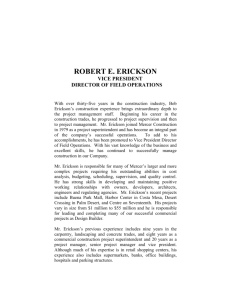
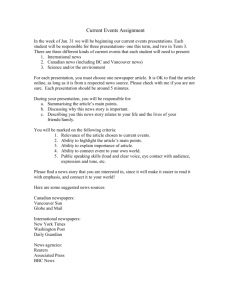
![Action Plan Training for College of Education [Erickson Hall]](http://s3.studylib.net/store/data/006838784_1-e08201da1f024d72d03dde66b95777a5-300x300.png)
